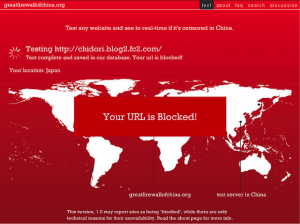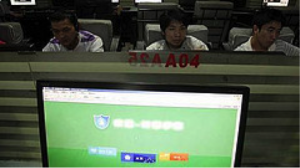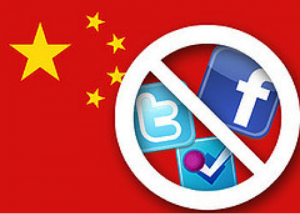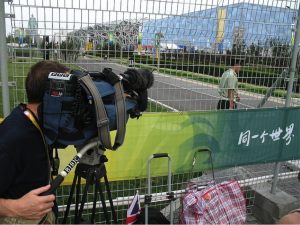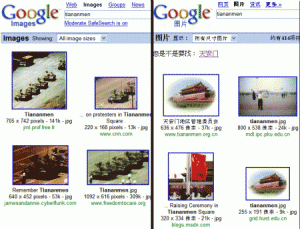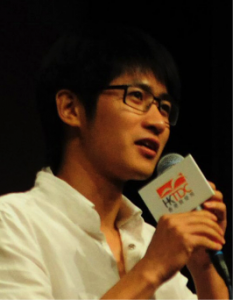By Justin Kane, Conner Griffin, and Jimbo Barnes
China has the largest Internet user population in the world with 500 million users. With this absurd amount of users, the Chinese government had to raise the bar when it came to censoring what their users can access and post on the web. The video “Behind the Chinese Firewall” China’s social media gives the Chinese public the opportunity to micro-blog with 300 million other people everyday. Although social media is completely legal, the government has blocked Google, Twitter, Facebook, and YouTube and replaced them with sites that are only available to the Chinese. They ban and copy all of the social media sites because without their own server in Beijing, they have no control of what people put up. The Government monitors everything that goes on these websites. For example if you put on Weibo, the Chinese version of Twitter, that you want to meet up somewhere with a group of people, the police could be waiting for you at your destination. If there is any suspicious activity, the police can arrest the group on the spot. Also, you cannot post the name of the president of Chongqing as well as any government leaders. China’s firewall is one of the biggest in the world for a reason, they want to protect their information and prevent it from spreading anywhere.
Anti, Michael. “TEDTalks: Michael Anti. Behind the Great Firewall of China.” Films On Demand. 2012. Accessed March 4, 2014.
BBC News reports “more than two million people in China are employed by the government to monitor web activity.” (BBC News 2012) China’s “Sina Weibo” is a micro blogging website that went viral in 2010 and has collected more than five-hundred million followers who post over one-hundred million messages daily. This website is now commonly used as a source for Chinese citizens to vent and criticize Chinese governmental actions. Tang Xiaotao, a designated monitor for this site says, “he sits in front of a PC everyday monitoring negative comments related to his clients, and then reports them.” (BBC News 2012)
Few people are aware of tactics taken by Chinese officials aimed at concealing societal criticisms, but the phenomenon is becoming more evident everyday. BBC news continues, saying that there are many more websites like Sina Weibo, and many more agencies designed to sift through the postings. (BBC News 2012)
Freedom of speech and expression is a liberty that Chinese people don’t have, and great efforts are being made to punish people who feel differently.
By Jimbo Barnes, Conner Griffin, and Justin Kane
http://www.bbc.com/news/world-asia-china-24396957.
Rebecca MacKinnon states that 212,583 messages are deleted daily out of the 1.6 million articles checked on China’s Sina Weibo, adding up to more than 16 percent. (MacKinnon 2009) Common American social media programs including Facebook and Twitter are forbidden in China. Without these networks, Chinese citizens are forced to find other ways to express themselves. The domestic Chinese micro blogging website, Sina Weibo, has turned into China’s twitter. Sina Weibo is now a countrywide phenomenon, and according to First Monday, Chinese people are “found to be spending more time online and are more likely to contribute to online forums than people in all countries except Korea and France.” (MacKinnon 2009) The facts are simple, nobody in China has the right of freedom of speech, and even on forums and micro blogs like Sina Weibo, and they are always being watched. China’s filtering system is known as the “Great Firewall of China” because of how secure and closely watched the Chinese Internet is. (MacKinnon 2009)
By Jimbo Barnes, Justin Kane, and Conner Griffin
Chinese Media Censorship: Not Playing By the Rules
In 2007, the year before the Beijing Olympics were held, China held the number one spot for arresting journalists. This was not just a one-year coincidence; this was the 9th consecutive year that China had been the world’s leader of putting journalists in jail. China is very strict with the rules they set on media and act on anyone that poses a threat to them. China is very strict on their media censorship but they allow the public to report on simple things like: Sports, entertainment, consumer lifestyle, and local news safety. But many subjects that the government considers “unflattering” are still highly monitored and have tight restrictions on them. During the Beijing games, the Chinese government promised to follow the rules of Article 51 of the International Olympic Committee that stated, “all necessary steps in order to ensure the fullest coverage by the different media and the widest possible audience in the world for the Olympics.” (Kine 116) But the Chinese refused to follow these rules and continued to harass, intimidate, and detain local and foreign journalists.
By: Justin Kane, Jimbo Barnes, and Conner Griffin
Worden, Minky. China’s Great Leap (New York, NY: Seven Stories Press, 2008), 115.
Chinese Media Censorship: Why censor the Internet?
With the emergence of the Internet in Chinese society, a “paradoxical relationship” between the government’s repressive censorship policies and the “freer” and “private-based” global Internet society has developed. The Chinese government views the Internet as dangerous instrument that can undermine its authority and legitimacy. China is classified as cyber-nationalist in its policies relating to the Internet, meaning that the government heavily regulates and censors what is put on the web. This stance is avant-garde to the way in which most countries handle Internet use. In the 2010 White Paper, a government publication that explains specific policies or issues, the government outlined its Internet policy, stating, “Spreading rumors” or posting on the Internet any information that may endanger “state security” or challenge “national unification” is illegal.
The government allows Internet activity as long as it coincides with Chinese economic interest, advances state nationalism, or strengthens the legitimacy of those in power. “Constant monitoring and surveillance of communications, propaganda activities…and accurate targeting of political and social threats” are tactics used to ensure that the regime remains in control. Those in power fear that an uncensored Internet will bring together uncontrollable social forces with both the means and willingness to engage in anti-regime discussion or activity.
By: Conner Griffin, Justin Kane, and Jimbo Barnes
Mueller, Milton L. “China and Global Internet Governance: A Tiger by the Tail.” Access Contested: Security, Identity, and Resistance in Asian Cyberspace (Cambridge, MA. MIT Press): 177-194.
A Picture Says 1000 Words About Google’s Censorship In China – Danny Sullivan
Chinese Media Censorship: power of blogs in today’s China
The Chinese government has allowed the rise of the Internet in China only as a means to help “business, entertainment, education, and information exchange” all the while effectively censoring Internet users from exchanging anti-regime opinions and discussion. Rebecca MacKinnon argues that in the future blogs could be a source for political change because they “enlarge the space for collaboration and conversation” about political issues. However, the Chinese government uses its vast resources to limit the scope of “participatory media” in China and she sites a 2005 study that concluded that the Chinese government has the most “broad-reaching system of Internet filtering in the world”. The Internet and blogging in particular could become a vehicle through which future political change could travel, but that it would not become the engine that powers the change. The cause for political change has to come from “charismatic and capable leaders”.
By: Conner Griffin, Jimbo Barnes, and Justin Kane
Mackinnon, Rebecca. Springer Science/Business Media. Accessed April 7, 2014. http://www.jstor.org/stable/27698209.
http://en.wikipedia.org/wiki/File:Han_Han_2.jpg

